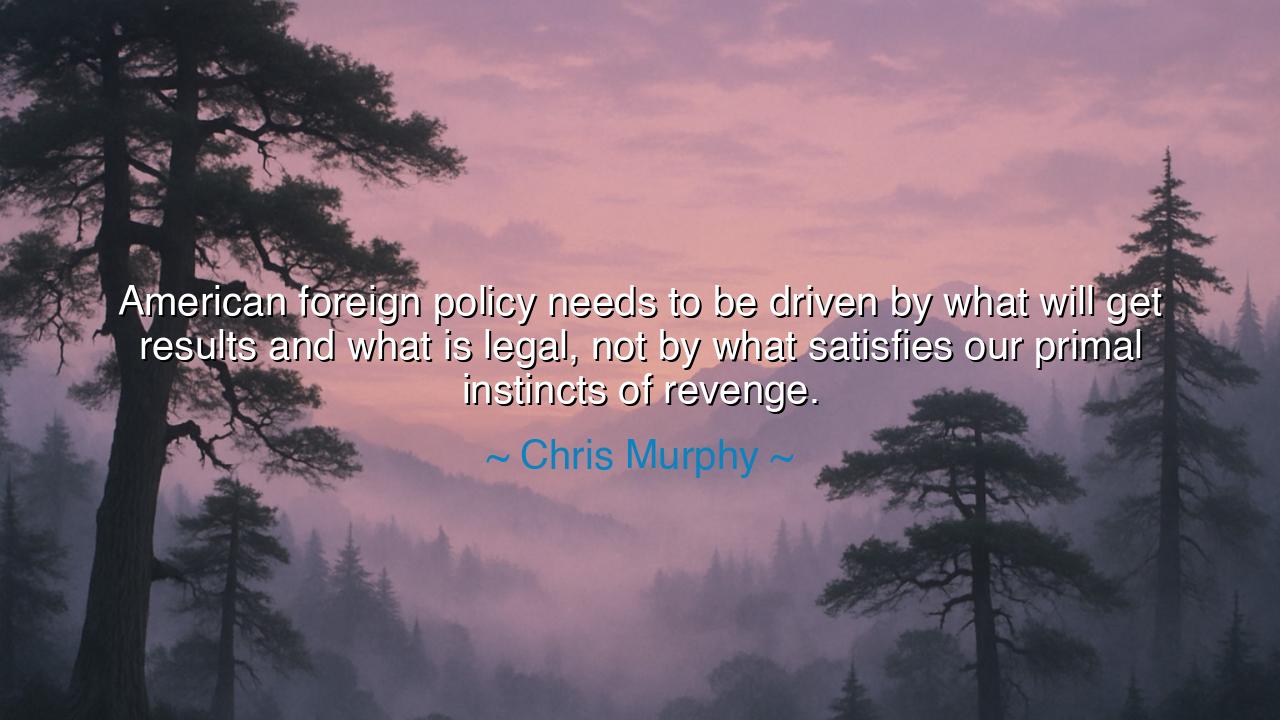
American foreign policy needs to be driven by what will get
American foreign policy needs to be driven by what will get results and what is legal, not by what satisfies our primal instincts of revenge.






Hear, O seekers of wisdom and watchers of nations, the solemn words of Chris Murphy: “American foreign policy needs to be driven by what will get results and what is legal, not by what satisfies our primal instincts of revenge.” These words shine like a torch in the darkness, for they warn of the ancient danger that has always beset rulers and peoples alike—the temptation to act in anger rather than reason, to wield power not for justice but for vengeance. For though revenge may burn brightly in the moment, it consumes all, leaving behind only ashes where progress might have grown.
The ancients long spoke against the rule of passion. The philosophers of Greece taught that the statesman must master his own impulses before he can guide the impulses of others. For when foreign policy is guided by wrath, it breeds endless cycles of blood. One war begets another, one strike calls forth retaliation, and nations become chained to fury rather than freed by wisdom. Murphy’s words remind us that the measure of a great nation is not in how swiftly it avenges, but in how wisely it acts to secure lasting peace.
Consider the story of World War I and the Treaty of Versailles. The victors, driven not only by justice but by the heat of resentment, imposed crushing penalties upon Germany. At first, this seemed a triumph, a satisfaction of grievances, a balm for wounded pride. Yet the result was not stability, but despair and rage, which gave birth to the horrors of Nazism and the greater war that followed. Here we see the truth of Murphy’s counsel: revenge may satisfy in the short term, but it rarely yields results that endure.
Contrast this with the wisdom of the Marshall Plan after World War II. Instead of crushing the defeated with punishment, the United States chose to rebuild Europe with generosity and lawfulness, binding old enemies into allies. The primal instinct for vengeance could have demanded destruction; but restraint, legality, and foresight created prosperity and decades of peace. This stands as a shining example of foreign policy guided not by passion but by principle, and its fruits endure even to this day.
The origin of Murphy’s words lies in the shadow of America’s recent history, particularly the wars and interventions born out of anger after the attacks of September 11, 2001. Driven by pain and fury, the nation rushed into conflicts that stretched for decades, cost countless lives, and drained vast treasure. In time, many came to see that the thirst for vengeance had led the republic into snares it could not easily escape. Murphy speaks, then, not as a distant philosopher, but as one who has watched his nation learn this lesson in blood and toil.
The meaning of this teaching is clear: foreign policy must be guided by what is legal, for without law, a nation loses its moral compass and its legitimacy among others. It must also be guided by what achieves results, for noble rhetoric or passionate vengeance accomplish nothing if they fail to create safety, stability, and peace. To govern by instinct alone is to act like the beast of the field; to govern by law and reason is to act like the steward of men.
The lesson for future generations is this: master your anger, both as individuals and as nations. Do not confuse vengeance with justice, nor punishment with progress. When wronged, seek not only to strike back, but to consider what will truly heal, what will truly secure the future. For vengeance looks backward, but wisdom looks forward. The greatness of a people lies not in the fierceness of its retaliation, but in the firmness of its vision for peace.
Practical action lies before all: demand that leaders respect the rule of law in their dealings abroad. Question those who offer only vengeance as policy, and support those who offer strategies grounded in legality and results. In your own lives, when wronged, resist the temptation of quick retaliation, and seek instead the path that brings resolution and peace. For the principles that govern the heart of a man also govern the fate of nations.
So let it be remembered: foreign policy founded on revenge is a house built on sand, but policy grounded in law and results is a fortress built on rock. Choose the higher path, and you will build peace that endures. Choose the lower, and you will inherit endless conflict. Thus Murphy’s words must echo through the halls of power and into the hearts of all: act with justice, not vengeance; with law, not passion; with foresight, not fury.






AAdministratorAdministrator
Welcome, honored guests. Please leave a comment, we will respond soon